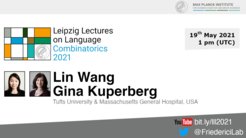
Lin Wang & Gina Kuperberg
Lecture 1 | Leipzig Lectures on Language—Combinatorics 2021
Does hierarchical predictive coding mediate language comprehension? Evidence from computational modeling and MEG/EEG

Predictive coding is a powerful computational theory of brain function. In this talk, we first outline the computational principles of hierarchical predictive coding. We then present a series of studies that use computational modeling, event-related analysis and Representational Similarity Analysis of MEG/EEG data to ask whether this theory can inform our understanding of the spatiotemporal activity produced during language comprehension. We show that, between 300-500ms after word onset, evoked activity within left superior and ventromedial temporal cortices corresponds to the prediction error produced by unpredicted but plausible inputs, while spatial patterns within left middle and inferior temporal cortices correspond to the convergence (“sharpening”) on lexico-semantic representations of inputs that confirm prior predictions. We further show that, even before new input becomes available, unique spatial and temporal patterns of neural activity correspond to the pre-activation of semantic and orthographic features of specific upcoming words. Together, these findings provide evidence that predictive coding may mediate language comprehension.
About the speakers
Lin Wang is a Junior Faculty Researcher (Instructor) at Massachusetts General Hospital, Harvard Medical School, working closely with the NeuroCognition of Language Lab—Department of Psychology at Tufts University, Boston. Her most recent work has focused on how humans predict upcoming linguistic information and the neural mechanisms underlying the processing of predicted and unpredicted information.
Gina Kuperberg is the Dennett Stibel Professor of Cognitive Science, Department of Psychology, Tufts University, and a Principal Investigator in the Psychiatry Neuroscience Program at Massachusetts General Hospital, Harvard Medical School. She and her lab use multimodal neuroimaging techniques (EEG, MEG, fMRI), in combination with computational modeling, to understand the neurocognitive mechanisms by which the human brain builds meaning from language, and how these mechanisms break down in neuropsychiatric disorders such as schizophrenia.
Keywords: language processing; incremental comprehension; linguistic predictions; RSA; language disorders
